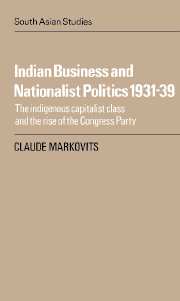 Indian Business and Nationalist Politics 1931–39
Indian Business and Nationalist Politics 1931–39 In recent works on the history of Indian nationalism, there is a perceptible shift away from ideological generalizations towards detailed studies of the political processes on an area basis. One school of historians has emphasized the role of the local and regional elites in the growth of political organization and tended to question traditional assumptions about the existence of a unified nationalist movement cemented by a common ideology. Other historians have sought for a broader concept of nationalism encompassing the specific politics of the non-elite elements in society, the ‘subaltern’. Most of the research done by both schools has been focused around the politics of the rural areas, a fact which is easily accounted for by the predominantly agrarian character of the Indian colonial economy. The specific politics of the urban areas and in particular the role of the capitalist strata have not yet received all the attention they deserve. One of the few in-depth studies of urban politics, by Bayly, is concerned with Allahabad, a city with practically no modern industries, whose wealth was largely based on regional trade and the exploitation of links with the neighbouring countryside. The politics of the more industrialized urban areas in the twentieth century have been a neglected field of study. Some attention has recently been paid to the urban working class and its political attitude but only Gordon's work on Bombay deals with the interventions of Indian businessmen in the political life. Given the increasing role played by these businessmen in the Indian economy, it appears that a more general and systematic study of their political behaviour is needed.
To save this book to your Kindle, first ensure [email protected] is added to your Approved Personal Document E-mail List under your Personal Document Settings on the Manage Your Content and Devices page of your Amazon account. Then enter the ‘name’ part of your Kindle email address below. Find out more about saving to your Kindle.
Note you can select to save to either the @free.kindle.com or @kindle.com variations. ‘@free.kindle.com’ emails are free but can only be saved to your device when it is connected to wi-fi. ‘@kindle.com’ emails can be delivered even when you are not connected to wi-fi, but note that service fees apply.
Find out more about the Kindle Personal Document Service.
To save content items to your account, please confirm that you agree to abide by our usage policies. If this is the first time you use this feature, you will be asked to authorise Cambridge Core to connect with your account. Find out more about saving content to Dropbox.
To save content items to your account, please confirm that you agree to abide by our usage policies. If this is the first time you use this feature, you will be asked to authorise Cambridge Core to connect with your account. Find out more about saving content to Google Drive.